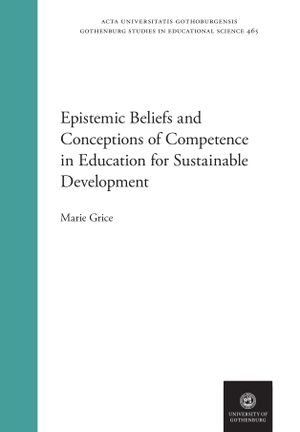Vi har bytt namn till Adlibris Campus! Campusbokhandeln ❤️ Adlibris - Läs mer här

Epistemic beliefs and conceptions of competence in education for sustainable development | 1:a upplagan
- Häftad, Engelska, 2022
- Författare: Marie Grice
- Betyg:
Från
282
kr
Finns i lager i .
Beskrivning
Education for sustainable development (ESD) raises critical questions regarding what knowledge should be taught and what the learning outcomes should be. The aim of this thesis is to explore epistemological, ethical and critical dimensions of ESD. There are two empirical sites. One is a transdisciplinary educational project with upper-secondary Swedish students (n=208) from 16 different schools, the other involves teachers (n=158) at a large Swedish upper-secondary school implementing ESD. The research design is emergent, combining empirical and theoretical studies. A questionnaire instrument to explore students’ epistemic beliefs (personal theories of knowledge and knowing) was constructed. Exploratory factor analysis identified five dimensions: transdisciplinary, certain, quick, collaborative, and simple knowledge. These showed predictive power in a multiple regression analysis. Another instrument was constructed to examine teachers’ ESD competences. Four dimensions were identified. Wicked sustainability challenges require the individual, education and society to adopt new ways of thinking, learning and acting. Calls for transformation, supported by supranational organizations, have contributed to an increased focus globally on competence-oriented knowledge in curricula. Ethical competence, action readiness, and normative competence are nested concepts explored theoretically in this thesis. Philosophizing with is a central method, which invites epistemology as a voice into the analysis. Transdisciplinary and pluralistic ESD allow for ethical issues to surface in the classroom. It is theorized that an ESD teacher needs to be both morally sensitive and ready to transform didactics in the teacher-learner nexus. One conclusion is that students’ sophisticated epistemic beliefs may be important antecedents in transdisciplinary ESD. Another is that the element of action in the conceptualization of competence remains a critical aspect for educational research and practice.
Parts of work
Paper I Grice, M., & Franck, O. (2014). A phronesian strategy to the education for sustainable development in Swedish school curricula. Journal of Education for Sustainable Development. 8(1), 29–42. visa artikel
Paper II Grice, M. (2014). Epistemic beliefs and knowledge creation among uppersecondary students in transdisciplinary education for sustainable development. Nordidactica. (1), 146–169.
Paper III Grice, M., & Franck, O. (2017). Conceptions of ethical competence in relation to action readiness in education for sustainable development. Reflective Practice. 18(2), 256–267. visa artikel
Paper IV Grice, M. (2017). Philosophizing with transdisciplinarity, relational knowledge and ethics in education for sustainable development, In O. Franck and C. Osbeck (Eds.) Ethical Literacies and Education for Sustainable Development: Young people, subjectivity, and democratic participation. Cham: Palgrave Macmillan. visa artikel
Paper V Grice, M., Mogren, A., Grantz, H., & Gericke, N. (2018) Kompetenser för lärare inom utbildning för hållbar utveckling – konstruktion av ett enkätinstrument [Teacher competences in education for sustainable development – the development of a questionnaire instrument]. Pedagogisk forskning i Sverige, 23(3–4), 262–289.
Paper VI Grice, M., & Franck, O. (manuscript, 2021) Focusing on moral literacy and normative competence in education for sustainable development.
Produktinformation
Kategori:
Pedagogik & psykologi
Bandtyp:
Häftad
Språk:
Engelska
Upplaga:
1
Utgiven:
2022-01-28
ISBN:
9789179630874
Sidantal:
138